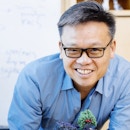Programming Cell Signaling Networks
- Speaker
-
 Wendell LimDepartment of Cellular and Molecular Pharmacology Chair and Professor
Wendell LimDepartment of Cellular and Molecular Pharmacology Chair and Professor
Presidential Lectures are free public colloquia centered on four main themes: Biology, Physics, Mathematics and Computer Science, and Neuroscience and Autism Science. These curated, high-level scientific talks feature leading scientists and mathematicians and are intended to foster discourse and drive discovery among the broader NYC-area research community. We invite those interested in the topic to join us for this weekly lecture series.
By clicking to watch this video, you agree to our privacy policy.
The design principles of cell signaling circuits allow cells to sense their environment, to process this information and to make complex response decisions. Wendell Lim and his collaborators are using synthetic biology approaches to systematically build cell networks to understand their design logic. They are harnessing this understanding to program cells with customized sensing-actuator functions — one example is smart therapeutic immune cells that can recognize and treat complex diseases, such as cancer inflammation and degeneration.
In this lecture, Lim will discuss the design principles of molecular circuits that govern cell decision-making and responses. He will also describe how these principles can be harnessed to engineer cells with customized therapeutic response programs.
